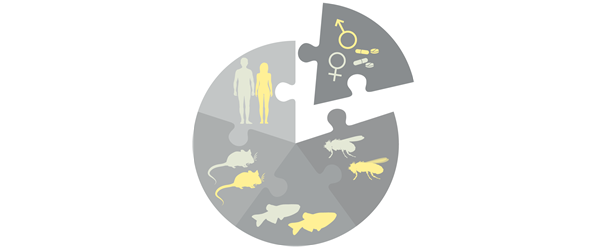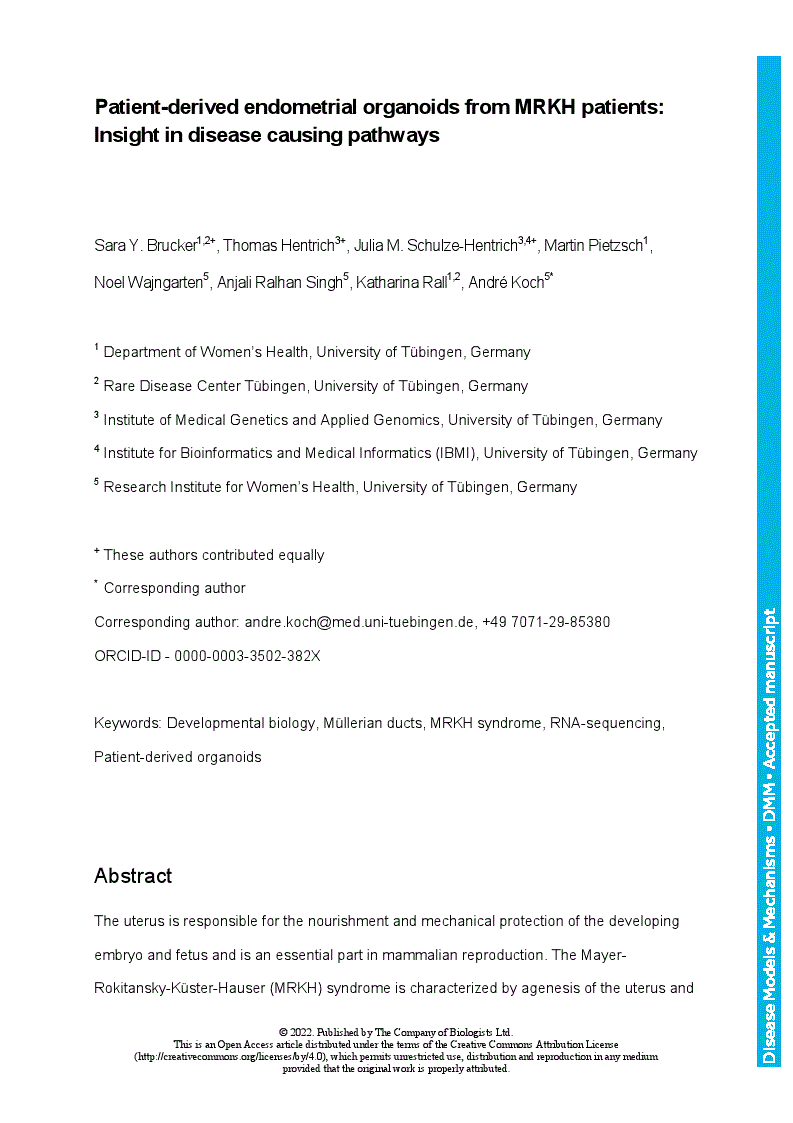The uterus is responsible for the nourishment and mechanical protection of the developing embryo and fetus and is an essential part in mammalian reproduction. The Mayer-Rokitansky-Küster-Hauser (MRKH) syndrome is characterized by agenesis of the uterus and upper part of the vagina in females with normal ovarian function. Although heavily studied, the cause of the disease is still enigmatic. Current research in the field of MRKH mainly focusses on DNA-sequencing efforts and, so far, failed to decipher the nature and heterogeneity of the disease, thereby holding back scientific and clinical progress. Here, we developed long-term expandable organoid cultures from endometrium found in uterine rudiment horns of MRKH patients. Phenotypically, they share great similarity with healthy control organoids and are surprisingly fully hormone responsive. Transcriptome analyses, however, identified an array of dysregulated genes that point at potentially disease-causing pathways altered during the development of the female reproductive tract. We consider the endometrial organoid cultures to be a powerful research tool that promise to enable an array of studies into the pathogenic origins of MRKH syndrome and possible treatment opportunities to improve patient quality of life.
Patient-derived endometrial organoids from MRKH patients: Insight in disease causing pathways
These authors contributed equally
- Award Group:
- Funder(s): Deutsche Forschungsgemeinschaft
- Award Id(s): 351381475
- Funder(s):
Currently Viewing Accepted Manuscript - Newer Version Available
- Split-screen
- Views Icon Views
- Open the PDF for in another window
-
Article Versions Icon
Versions
- Version of Record 10 May 2022
- Accepted Manuscript 08 April 2022
- Share Icon Share
-
Tools Icon
Tools
- Search Site
Sara Y. Brucker, Thomas Hentrich, Julia M. Schulze-Hentrich, Martin Pietzsch, Noel Wajngarten, Anjali Ralhan Singh, Katharina Rall, André Koch; Patient-derived endometrial organoids from MRKH patients: Insight in disease causing pathways. Dis Model Mech 2022; dmm.049379. doi: https://doi.org/10.1242/dmm.049379
Download citation file:
Advertisement
Sex matters in preclinical research

DMM calls for improved inclusion, analysis and reporting of sex as a biological variable in preclinical animal modelling research. Read the full Editorial by Monica J. Justice.
Subject collection: Building advocacy into research

DMM’s new series - Building advocacy into research - features interviews, ‘The Patient’s Voice’, with patients and advocates for a range of disease types, with the aim of supporting the highest quality research for the benefit of all patients affected by disease.
Travelling Fellowships for early-career researchers

DMM and its sister journals offer Travelling Fellowships of up to £3,000 to graduate students and post-doctoral researchers wishing to make collaborative visits to other laboratories. Find out more about our Travelling Fellowships and read stories from previous grant recipients.
Read & Publish Open Access publishing: what authors say

We have had great feedback from authors who have benefitted from our Read & Publish agreement with their institution and have been able to publish Open Access with us without paying an APC. Read what they had to say.
The Forest of Biologists
Our Publisher Claire Moulton recently visited the two Woodland Trust UK sites where we are planting new native trees for published Research and Review papers and protecting ancient woodland on behalf of our peer reviewers.
Other journals from
The Company of Biologists



